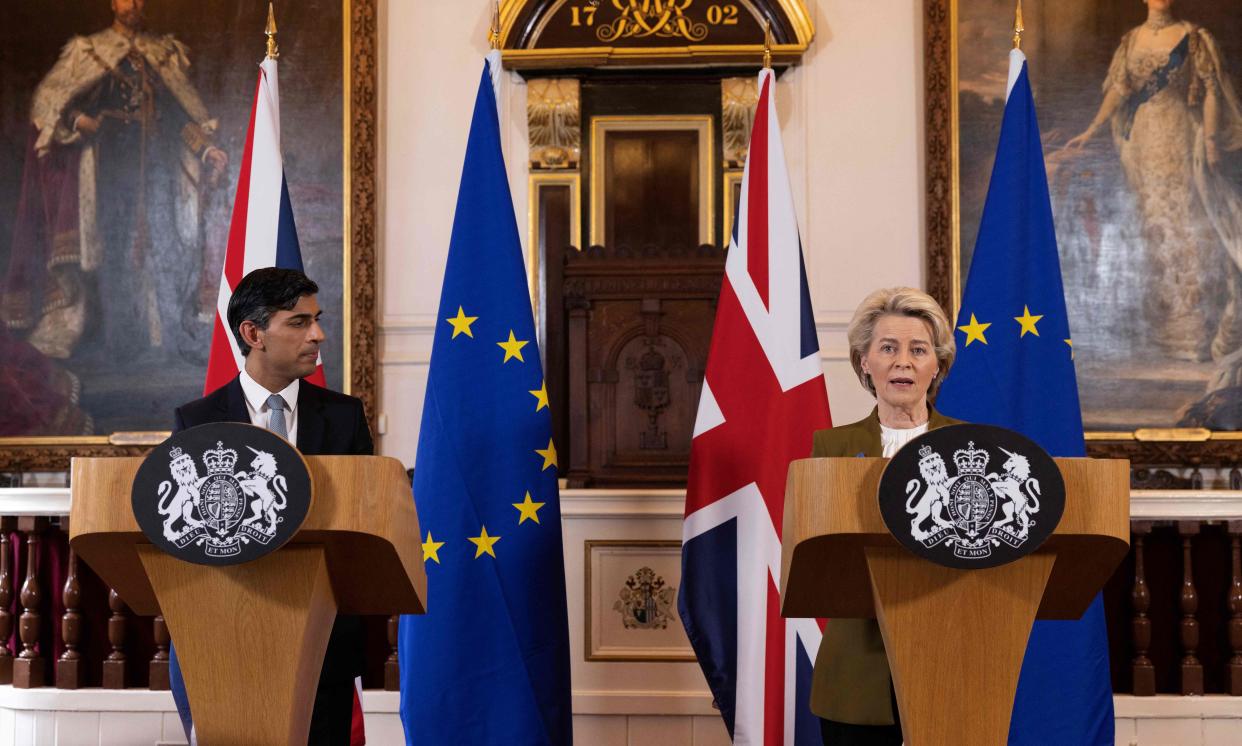The Guardian view on the Windsor framework: facing up to the Brexit mess

Rishi Sunak is right to think that securing a new deal on Northern Ireland’s trading arrangements with the European Union is a “turning point”. Nowhere does Brexit’s promise to slash red tape ring more hollow than in the region. The revised terms of the protocol will soften the Irish Sea border, but will not end it. That is likely to be the stick waved at the prime minister by hardline Brexiters in his party. Yet these are the MPs – led by Boris Johnson – who claimed that the Irish border would be unaffected by leaving the EU. It is the Conservative party’s failure to confront this thinking head on that has done so much damage to the country.
The prime minister is taking a calculated risk. Mr Sunak plainly desires a better working relationship with Brussels. The Tory leader wants to be able to get on with reviving the UK economy and ensure that his summit with the French president next month gets a deal on small boat crossings. Britain would gain from having better relations with our European friends. Mr Sunak’s approach has brought an immediate benefit. No longer is the UK is likely to breach international law after the prime minister dropped the Johnson-era bill designed to dodge the government’s own EU deal.
London and European capitals are facing up to the mess of Brexit. The original protocol was proving unworkable, something highlighted when some rules had to be abandoned because the flow of medicines was being disrupted. Not only was it failing to protect the single market, it had also proved problematic for power-sharing self-government. In giving a say over new EU rules to Stormont, unionists have the degree of sovereignty they crave. The “Stormont brake” allows for the UK to stop new single market rules being adopted in Northern Ireland. Continued divergence between the UK and the EU would be likely to gradually harden the sea border over time, presenting a headache for Brussels, keen to protect the single market.
This is an academic discussion while the Democratic Unionist party contines to boycott Stormont. The party swapped its support of the protocol for outright opposition when it was outflanked by a smaller rival. If the DUP backed the deal then Tory MPs would find it hard to sustain their hostility.
It is no surprise, therefore, that the prime minister has focused on DUP complaints, arguing that the “Windsor framework” will reduce the role of EU law and the European court of justice. Yet the spectre of the Traditional Unionist Voice – a party that is to the right of the DUP – spooks its larger rival. Jim Allister, the leader of the TUV, was quickly out of the blocks to say that he would vote against the new deal.
The prime minister is obviously not out of the woods. Once the detail emerges, there could be ministerial resignations. There is no legal requirement for MPs to pronounce on his deal, but Mr Sunak says “parliament will have a vote at the appropriate time and that vote will be respected”. This gives him the advantage of timing over his would-be opponents who might otherwise find a way to engineer a vote at a moment of maximum danger and force the government to win with Labour support, which would damage, perhaps fatally, Mr Sunak. There is little to crow about. The prime minister is fixing mistakes that he as a Brexiter is responsible for.

 Yahoo News
Yahoo News 
